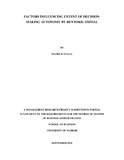Factors Influencing Extent of Decision-making Autonomy by Rentokil-initial
| dc.contributor.author | Nyaga, Patrick | |
| dc.date.accessioned | 2012-11-13T12:37:19Z | |
| dc.date.available | 2012-11-13T12:37:19Z | |
| dc.date.issued | 2010 | |
| dc.identifier.uri | http://erepository.uonbi.ac.ke:8080/handle/123456789/5698 | |
| dc.description.abstract | The relationship between the parent company and its subsidiary is becoming central to an understanding of the functioning of MNCs because subsidiaries play an increasing role in generating competitive advantages for the MNC. Research has shown that the level of autonomy given to subsidiaries differ from MNC to MNC. This study sought to analyze the factors that influence the extent of decision making within MNC subsidiaries operating in Kenya with a specific focus on Rentokil-Initial. This was a case study design where primary data was collected using structured questionnaires. These were selfadministered to the 7 managers selected for the study. The analysis was done using descriptive analysis aided by the SPSS. The study found that Rentokil Initial Kenya did not have autonomy over financial decisions. The study revealed that the subsidiary had some considerable level of autonomy over decisions regarding marketing and production. The results also suggested that the subsidiary had autonomy over many decisions regarding employment and personnel. The study revealed that R&D and technology decisions were made by the parent after consulting the subsidiary thus the subsidiary did not have autonomy over them. The study found that all the MNC level factors as well as subsidiary level factors had a highly significant influence on decision making autonomy while HQ-subsidiary relationship factors had an average influence on decision making autonomy. The study recommends that there is need for more autonomy in the subsidiary over financial decisions as well as over marketing decisions. There is also need for other MNCs to loosen some control especially when the overall goal of the MNC is to expand their markets. More studies need to be done especially on a wider scale among the MNCs and with higher statistical tools such as regression or correlation analysis to determine the influence of decision making autonomy on the competitiveness of the subsidiaries within the local market in which they operate. | en_US |
| dc.language.iso | en_US | en_US |
| dc.publisher | University of Nairobi, Kenya | en_US |
| dc.title | Factors Influencing Extent of Decision-making Autonomy by Rentokil-initial | en_US |
| dc.title.alternative | Thesis (MBA) | en_US |
| dc.type | Thesis | en_US |

